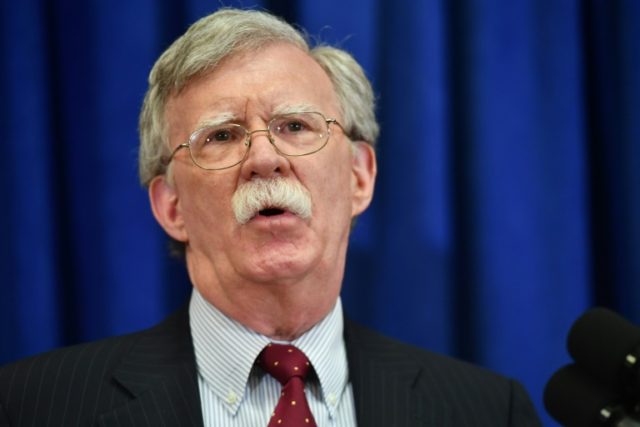National Security Advisor John Bolton warned the Chinese government Tuesday that Washington would sternly oppose any attempts to block free transit in the international waters of the South China Sea.
The public caution anticipates Beijing proposing a “code of conduct” in the region to grant it control of territory far outside its borders.
China claims most of the South China Sea and has illegally constructed islands and military facilities in territory belonging to the Philippines and Vietnam. The Permanent Court of Arbitration at the Hague declared all of China’s activities in the Spratly and Paracel Islands, the affect areas, illegal in 2016. China vowed to ignore the ruling and has faced minimal opposition from the affected countries, whose militaries cannot compete with the vast People’s Liberation Army (PLA).
Bolton is in Singapore attending the annual Association of Southeast Asian Nations (ASEAN) conference. In addition to the aforementioned countries, China claims territory belonging to Malaysia, Brunei, Taiwan, and Indonesia, all of whom participate in ASEAN in some capacity. All but Taiwan are member states; China blocks Taiwan from participating as a sovereign state and claims to represent it as a province.
Speaking to reporters on the sidelines, Bolton asserted that Washington would “oppose any agreements between China and other claimants to the South China Sea that limit free passage to international shipping, and that American naval vessels would continue to sail through those waters,” according to the Wall Street Journal.
Should ASEAN agree on a new code of conduct in disputed waters, Bolton asserted it “has to be mutually acceptable, and also has to be acceptable to all the countries that have legitimate maritime and naval rights to transit and other associate rights that we don’t want to see infringed.”
Bolton has warned repeatedly that China’s growing presence in the South China Sea, particularly when forcing Vietnamese and Philippine ships out of their own domestic waters, presents a dire geopolitical threat.
“China’s creating the ground in the South China Sea and putting more facts on top of it,” Bolton argued in September. “It’s very dangerous, very aggressive, something that the administration has confronted.”
Other key members of the Trump administration have made similar remarks. This weekend, Secretary of State Mike Pompeo and Defense Secretary Jim Mattis met with senior Chinese officials to discuss both economic and geopolitical points of concern. Both highlighted concerns in the South China Sea. Pompeo told reporters, “we want to ensure that China acts responsibly and fairly in support of security and prosperity of each of our two countries.”
Speaking at ASEAN on Tuesday, Chinese Premier Li Keqiang insisted that China is not seeking hegemony in the region, but asserted that Beijing would play a major role in writing the expected code of conduct in the South China Sea.
“China is ready to work with all parties to discuss how we can improve free trade and make globalization healthier,” Li said. “I want to reaffirm here that China will stay firm on the course of peaceful development. In the Chinese culture, we value peace as of paramount importance and we don’t do to others what we don’t want others to do to us.”
China’s state-run publication Global Times warned in anticipation of the ASEAN summit that the United States would pose a barrier to asserting Chinese control of the region.
“The South China Sea situation has been stable, but since US Vice President Mike Pence is expected to attend the summit, the topic might be put forward,” a Chinese government expert is quoted as saying. China insists that only the United States objects to its colonization of others’ sovereign territory in the region and that “and the ASEAN countries have come to a consensus on the South China Sea issue.”
As recently as a week ago, however, the Vietnamese government lodged a stern complaint with China over its debut of what it claims to be a weather monitoring system in Vietnam’s Spratly islands. China claims the weather system will help seafarers navigate more safely. Having the ability to send such weather warnings and controlling the region would also allow China to hypothetically block ships from traveling freely, citing alleged weather dangers. While Vietnam and China are both communist countries, their governments have experienced a significant diplomatic rift over the South China Sea issue.

COMMENTS
Please let us know if you're having issues with commenting.